First Impressions at a Border Refugee Camp
By James Addis – World Vision Correspondent
James Addis' first day at third country national (TCN) camp close to Jordan's Iraqi border. World Vision is supporting a kitchen at the camp in association with the Jordanian Evangelical Committee for Relief and Development (JECRaD), an alliance of churches and Christian NGOs.
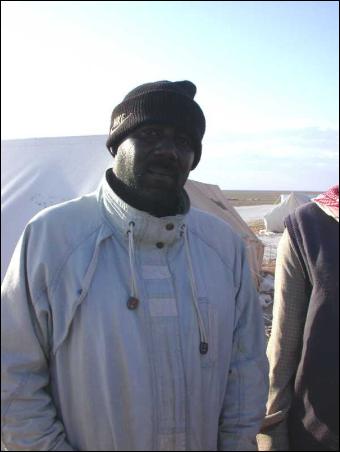
Nesreldin Khalid broke down when he said he could not reach his family
Today is the first day of operation of the World Vision supported kitchen at the TCN. Camp. When I arrive about 2.40pm, things seem hectic but also well organised. The kitchen is situated in a large Rubb Hall. Down one side of the tent are about ten 100 litre pots sited on enormous gas stoves. Down the other side another 15 or 16 identical pots are ready to be used. Today, only about two or three are filled with a vegetable and lentil soup. Today is Sunday. None of this was here on Friday. JECRaD workers have worked 20 hour days to get things to this stage.
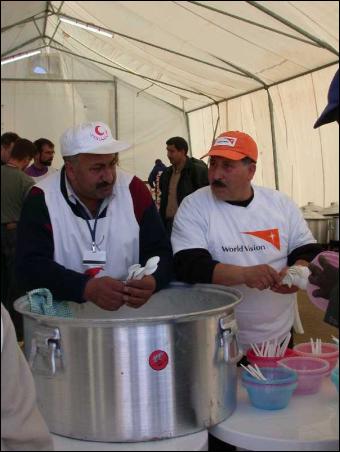
Red Crescent and World Vision working together in the kitchen.
At about 3.15 the one hot meal of the day is served. Today they are serving 371 refugees and about 300 volunteers ? those still involved in hastily putting in sanitation, showers and erecting tents. The TCNs mostly Sudanese drift in taking a plastic bucket of soup and rounds of bread back to their tent. Each takes for everybody living in their tent so numbers appearing at the kitchen are not huge. In the main they appear quiet and reasonably well-dressed. Though some are clearly traumatised. Nasreldin Khalid, a 40- year- old Sudanese man describes leaving everything in Baghdad. As we chat he finds the questions I'm asking more and more uncomfortable. He breaks down and begins to cry when he says that he has not been able to contact his family in Sudan. They do not know what has happened to him.
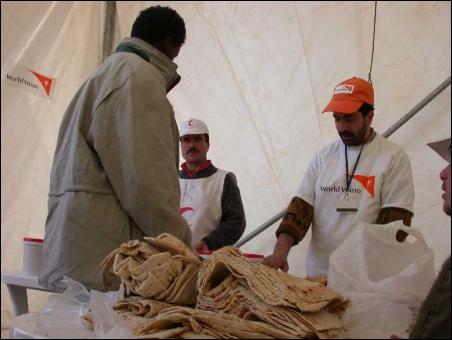
Serving bread.
Christi Jones of the Do Not Forget to Do Good Society ? part of the JECRaD alliance is happy with the way things are running. She says TCNs don't actually fit the technical definition of a refugee and as a result most aid resources have gone to the Iraqi camp a few kilometres away. Rather ironic given the Iraqi camp is currently empty.
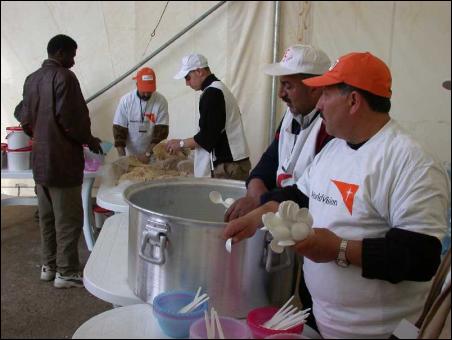
Serving in the kitchen.
As Christi says she is pleased to be working with the TCNs. "They feel the same cold, they feel the same hunger," she says.
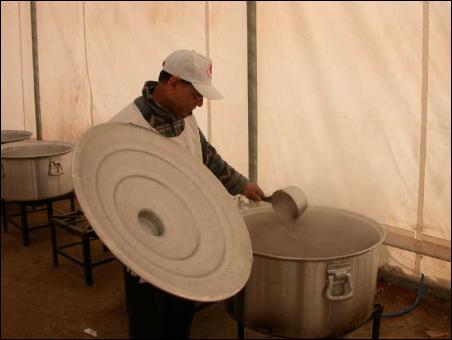
Tea is brewed.
Cold is the one thing I'm feeling
too. Tapping away at the keyboard at one end of the kitchen
Rubb Hall. I'm pleased I brought a good sleeping bag. The
area surrounding the camp is flat and barren. Fierce winds
create dust storms that plague the area. Indeed they have
delayed the set up of the
camp. It's not going to be
especially pleasant here. You have to admire the volunteers
though. As I write (about 7.30pm) Red Cresent volunteers
pack up rounds of bread for breakfast. They're singing,
laughing and joshing with one another.
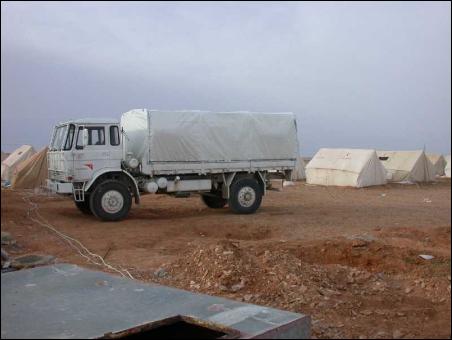
World Vision truck at TCN Camp.
Sudanese refugee Yonis Adam, 33, says the food's not bad and it's free so he can't complain, as he munches on a piece of Xubz, the typical round flat bread of the Middle East.
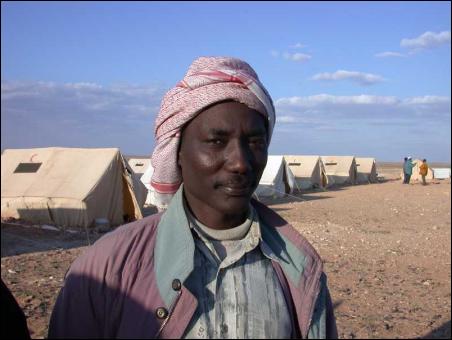
Beside him is a pot of high-calorie lentil soup, a bag of olives and a soft drink. All supplied by the World Vision supported camp kitchen at the third country national refugee camp at Ar Ruwayashid, close to the Iraqi border.
"This morning there was also tea he says. "That's good it gets very cold here at night."
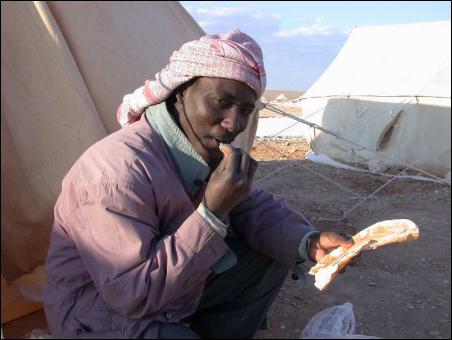
Yonis' endorsement of the food is hardly ecstatic but as he takes a moment to relax and chat in the weak afternoon sun, he reflects that there's been precious little else to sing about in the last three days.
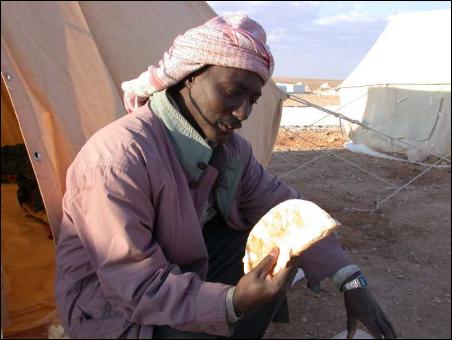
The day before the United States launched cruise missile attacks against Baghdad, Yonis thought it prudent to consult his embassy about what he should do.
They told him a bus was organised to go to the border. It was leaving in two hours and he should be on it.
Yonis decided to take the bus. He had no time to collect his things. In his pocket he says he had only a small wad of "worthless" Iraqi dinar.
"They said we are not responsible for you after you leave Baghdad, so it must have been God who kept us until we got here," says Yonis, who arrived at the border at midnight just hours before the bombs began to fall.
As a third country national Yonis will likely be sent back to Sudan within days but says he has no desire to return to his home country.
"I've spent 12 years in Iraq and everything I owned is still there, I've had to leave it behind. I can't go back to my family holding only ten fingers in my hand," he says half laughing and half in sorrow.
His real preference would be to return to Iraq.
"If the war finishes I will return back there no problem," he says, "I have a strong feeling for the Iraqi people. They're tired of war. I don't know whether they like Saddam Hussein or not but I do know they want to live in peace."
Yonis is one of just over 300 third country nationals who have so far made it to a camp set up especially for their benefit at Ar-Ruwayshid. Another camp specifically for Iraqis has yet to have any occupants. It's suspected they may be prevented from leaving their country.


 Eugene Doyle: The West’s War On Iran
Eugene Doyle: The West’s War On Iran Richard S. Ehrlich: Deadly Border Feud Between Thailand & Cambodia
Richard S. Ehrlich: Deadly Border Feud Between Thailand & Cambodia Gordon Campbell: On Free Speech And Anti-Semitism
Gordon Campbell: On Free Speech And Anti-Semitism Ian Powell: The Disgrace Of The Hospice Care Funding Scandal
Ian Powell: The Disgrace Of The Hospice Care Funding Scandal Binoy Kampmark: Catching Israel Out - Gaza And The Madleen “Selfie” Protest
Binoy Kampmark: Catching Israel Out - Gaza And The Madleen “Selfie” Protest Ramzy Baroud: Gaza's 'Humanitarian' Façade - A Deceptive Ploy Unravels
Ramzy Baroud: Gaza's 'Humanitarian' Façade - A Deceptive Ploy Unravels